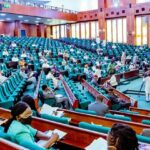
The Chairman of the National Peace Committee, General Abdulsalami Abubakar (retd.), and the Chairman of the Transition Monitoring Group, Auwal Rafsanjani, on Tuesday decried the level of vote-buying recorded in the last Saturday’s governorship election held in Ekiti State.
The African Democratic Party and Social Democratic Party had on Sunday rejected the outcome of the election, accusing the All Progressives Congress and the Peoples Democratic Party of engaging in vote-buying.
But the governor-elect, Biodun Oyebanji, on Monday, dismissed claims by rival political parties that the APC was involved in vote- buying during the election.
Abdusalami made the position of his committee known in a statement made available to journalists on Tuesday.
The statement read, “We strongly decry the incidence of vote-buying recorded during the elections and urge the security agencies to ensure that investigations are conducted, that all perpetrators of this anti-democratic acts are prosecuted and brought to justice with the provisions in the electoral law.
“The practice of vote-buying undermines the values which underpin our democratic life. It reduces the privileged selection of those who steward our commonwealth through our electoral processes, as being transactional.
“We must hold to account all who would muddy the springs from which we as a people seek to drink from collectively by such actions of bribery, both the giver and receiver.”
Abdulsalami urged Oyebanji to be magnanimous in victory and do away with any act that could affect the peace of the state.
He also called on those aggrieved with the outcome of the election to seek redress in the court.
Rafsanjani, in a separate statement, condemned vote-buying by politicians and political parties in the election.
He said, “Vote-buying was observed across the 16 local government areas of the state with political parties bidding for the votes of electorate.
“The ability of Ekiti politicians to make light of such a grave violation of extant law is most unfortunate. Transformation Monitoring Group condemns this blatant violation of the electoral law.”
He however commended the Independent National Electoral Commission for deploying security operatives at the polling units on time and voters for their comportment at the various polling centres.
He added, “Priority voting was given to voters such as People Living with Disabilities, elderly persons and pregnant women in most of the polling units in the state by INEC.
“Reports from field observers indicate that it takes at least three minutes to accredit a voter using the Bimodal Voter Accreditation System in 41% of the locations observed. Going by this, the BVAS would have successfully accredited 20 voters per hour on the average in the affected voting locations.”
“However, INEC’s strategy of voters’ redistribution failed to address the problem of over-concentration of voters in some polling units, and we urge INEC on the need to double its effort to improve the turnaround time of the BVAS of one minute per voter for a seamless process on election day,” he added.













